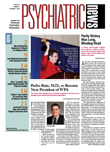Most state Medicaid programs are expected to face budget shortfalls next year as the nation's economy stalls and demand for public health care assistance continues to rise, according to an annual survey of state program directors.
The 50-state survey of the directors was conducted by the Kaiser Family Foundation's Kaiser Commission on Medicaid and the Uninsured (KCMU) and released in late September.
“We're just beginning to see the impact of the economic slowdown, as growing Medicaid enrollment and shrinking revenues pose new threats for health coverage,” said Diane Rowland, KCMU executive director.
Medicaid is a jointly funded state and federal program that pays for health coverage and long-term-care support to more than 44 million people in low-income families and nearly 14 million elderly and disabled individuals. Medicaid pays for more than half of all publicly financed mental health services in the United States and accounts for 26 percent of the country's total mental health spending, according to KCMU. About 13 percent of all Medicaid beneficiaries receive mental health care through the program.
The survey found that Medicaid enrollment nationwide grew 2.1 percent in Fiscal 2008, while states increased Medicaid spending by 5.3 percent. That jump in spending was significantly higher than spending in each of the previous two years.
Respondents estimated that Medicaid enrollment will jump 3.5 percent and that state spending will increase 5.8 percent in 2009. In Fiscal 2006, the latest year for which nationwide numbers are available, states spent a total of $100.6 billion on their Medicaid programs.
Economy Could Cause Enrollment Spike
The increased use of Medicaid services and rising cost to the states come as the nation confronts an economic downturn, and states face tightening budgets. Thirty states already have confronted significant budget shortfalls as they prepared their Fiscal 2009 budgets.
Two-thirds of Medicaid programs are likely to face a budget shortfall, according to the directors. Midyear shortfalls could force abrupt changes to control costs, potentially including cuts in eligibility and outreach efforts.
Medicaid directors attributed growth in enrollment to the deteriorating economies in their states, according to the survey. Some of the enrollment increases may be related to rising unemployment, loss of employer-based coverage, and declining incomes, making more individuals potentially Medicaid eligible. Ongoing state efforts to address the uninsured such as expanding Medicaid eligibility, improving outreach, and simplifying enrollment procedures also played a role in the growth.
But the eighth annual KCMU survey also identified some good news for state Medicaid programs, including the finding that more states made restorations, enhancements, or expansions to their Medicaid programs than made cuts in both Fiscal 2008 and Fiscal 2009. The improvements included increased provider reimbursements and in-home and community-based services for long-term care.
Nearly one-third of states expanded their managed care programs in Fiscal 2008. The most significant trends involved including people with disabilities in managed care, expanding managed care service areas, and requiring enrollment into managed care when it had previously been voluntary. States continue to focus on quality efforts such as pay-for-performance and implementation of new information technology initiatives.
A troubling finding for mental health advocates was the response of nearly all state Medicaid directors that “moderate or significant” problems were arising from the growing cost of mental health care, psychiatric medications, psychiatric hospital emergency room use, and inpatient psychiatric treatment. Increased utilization of mental health services, specifically, was reported as one of the leading drivers of increased Medicaid spending in Fiscal 2008.
Congress Considers Help
States may get temporary federal assistance to avoid a Medicaid funding crunch during the current economic downturn.
House Democrats plan to decide during a postelection lame-duck session the extent and cost of a second economic stimulus package, which is likely to include a temporary funding boost for state Medicaid programs.
Democrats have pushed for a second economic stimulus or recovery bill for months. The House passed a $60.8 billion package in September (HR 7110) that included Medicaid funding boosts. President George Bush threatened to veto the bill, and Senate Republicans objected to approving a similar measure (S 3604).
The Center for Budget and Policy Priorities (CBPP), a liberal think tank, recently called for state Medicaid program assistance similar to the $20 billion the federal government provided to states during the last recession in the form of increased Medicaid matching funds and general grants to states.
“The package averted even deeper cuts in public health insurance than actually occurred and helped prevent cuts in a wide variety of other critical services,” wrote Nicholas Johnson, director of the CBPP's State Fiscal Project, and colleagues in a September report.
The CBPP report detailed the increasing Medicaid cuts that states have made in recent months and concluded that an even larger federal Medicaid funding package may be needed than the one enacted in 2003 because the looming recession appears worse than the last downturn.
The KCMU report, “Headed for a Crunch: An Update on Medicaid Spending, Coverage, and Policy Heading Into an Economic Downturn—Results From a 50-State Medicaid Budget Survey for State Fiscal Years 2008 and 2009,” is posted at<www.kff.org/medicaid/7815.cfm>.▪
